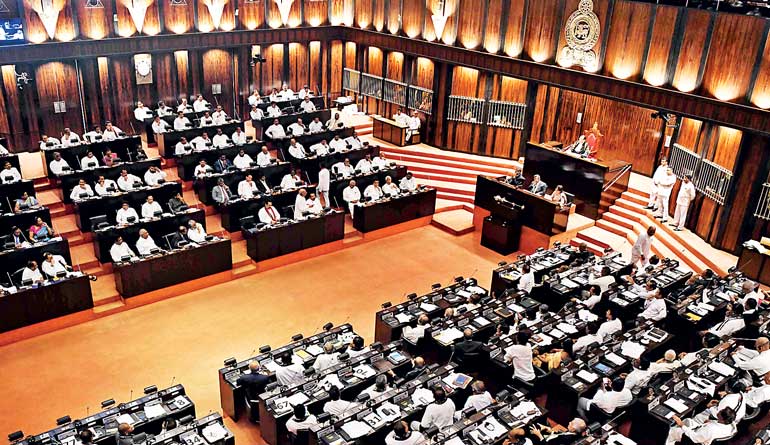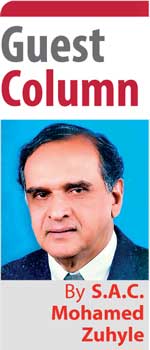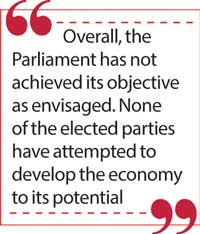Sunday Mar 01, 2026
Sunday Mar 01, 2026
Tuesday, 1 February 2022 00:50 - - {{hitsCtrl.values.hits}}

Objective
The parliamentary procedures require an assessment of its performance; this is an opportune time to achieve a result-oriented approach. Introducing a system similar to the Executive Committees functioned under the Donoughmore Constitution would be an option for consideration. This suggestion had been made by several people on different occasions. However, no serious steps have been taken to make it effective. This is an appropriate time while the Committee on Constitutional Reform is in process.
Introduction
The parliamentary system of governance in Sri Lanka needs a deeper examination on its performance for the past 73 years. The electoral system of voting and electing members of Parliament and the formation of the parliamentary system of governance came into effect in 1948 under the Soulbury Constitution. Although it was meant to be an inclusive system accommodating all demographics and to be a fair and equitable one, on closer examination, it has not been proved to be a success.
The Sri Lankan experience has been that in almost every parliamentary election, a political party gets elected and at the following election, based on their performance, they are either voted in or out of power. This has been the case, especially under the first past the post system. This pattern somewhat changed under the proportional representation system, which came into effect with the 1978 Constitution.
The voting out and changing of governments periodically, is theoretically a good democratic process. By this process, the people exercise their free will to choose their representative to the legislative body. The proportional representation system did not change the character of the parliamentary procedures. The major change was the introduction of the Executive Presidency. The Legislative Assembly remained in the same form and character. The political party that gets the majority at an election is called upon to form the Government while the Cabinet functions as before with the Executive President at the helm.
Shortfalls 
Under this parliamentary system the winning party members get all key positions such as the Cabinet Ministers, Ministers of State, etc. Members of the same party get elected as the speaker and deputy speaker. Some of the ruling party members and a few of the opposition get selected to committees such as COPE and COPA. Other MPs do not have any tangible role to play. In the eyes of the electorate, they are ineffective. The party in power devises various ways to give them some position of consolation but that too is insufficient to go around. This causes some frustration. Such MPs of the opposition are vulnerable to the offers by the ruling party. Some cross over for the sake of some perks and positions that are totally opposed to their mandate of the electorate and the political ideology of their own party.
Be that as it may within the Parliament, the party in power extends its authority outside as well, affecting the administration where virtually the whole public service gets politicised. Election to public offices, appointments to even lower grade positions such as clerks and assistants are carried out by the ruling party’s political establishment. Even at an electorate level, projects are decided upon on political preference, especially in awarding contracts.
For instance, the installation of a pipe borne water system, starting or upgrading schools, hospitals, etc. are all done by the party that is in power. People who voted for the opposition party will have to wait until their party comes to power to get such benefits. As can be observed, this political influence is damaging to the nation. To get an appointment to public office at any level, one needs to have political connections. This clearly shows that the hopes of the people who voted their representatives in, have not been fulfilled.
Overall, the Parliament has not achieved its objective as envisaged. None of the elected parties have attempted to develop the economy to its potential. No in-depth analysis of the national resources has been prepared even after 70 plus years of gaining independence. One could reasonably conclude that successive governments that had been in power failed to address this issue.
On the contrary we prioritised ethnic issues. This concern divided the nation; the nation was divided on the basis of ethnicity, regionalism, languages and so on. These were to directly or indirectly gain political power and to ‘survive’ in power. This has damaged the Nation deeply.
It is time to explore a change in the system. A chance to have positive development and participation of all MPs. They should concentrate on developing a goal for the nation as a whole. A few examples of the past are:
i. Greater indulgence of the all elected members with a clear futuristic discussion would have prevented the passage of the Citizenship Act of 1949.
ii. Greater involvement of consultative and focused participation of all MPs would have resulted in a refined language policy acceptable to all communities. Such an accommodative engagement would have saved the nation from inestimable economic and human loss.
iii. Nationalisation of plantation estates in 1972, is admittedly a big mistake which could have been avoided.
iv. Takeover of schools in 1972 too should have been done in an amicable manner.
There are many more examples that could be found in the history of the Parliament. Considering a change in the system of governance is appropriate and timely.
A new model
The Executive Committee System that came into effect under the Donoughmore Constitution in 1931 could provide some guidance to reform the current Parliamentary procedures.
The new model should be introduced to the present Parliamentary system with the introduction of Participatory Governance. This would be a participatory decision-making process where all representatives of parties would participate, contribute and be part of the decision-making process.
The proposal is that all members who are elected to Parliament should be brought into this process. A system where every aspect that affects the nation is assessed. Say a ruling party member becomes a Minister of a particular ministry, several members (say about 10 members) from all political parties represented in Parliament should become a consultative body of that particular Ministry. All those members should participate and contribute to the discussion in looking at options and opportunities towards the development of the country as a common objective. Such committees should objectively analyse the pros and cons and benefits to the nation and the population and so on. Arriving at a decision should be a well-deliberated one. Once that is done there will not be room for accusations or counter accusations. Once consensus is achieved the Cabinet of Ministers may get it passed by Parliament.
It is important to mention that in the current system there is a Consultative Committees, but it is ineffective. The members are not strictly bound to participate. This proposed system is mandatory for the members to serve as a member of the committee concerned.
The Speaker of the Parliament should take the leadership and share these proposals with the Party Leaders and some selected men of wisdom in the Parliament to consider the best possible ways of implementing the principles of this proposal. Having done that, the refined proposal should be forwarded to the currently functioning Constitutional Reform Committee.
The following guidelines could be followed and could be further refined:
a. There should be a well-developed structure of the Committees and a set of guidelines.
b. This process would be Governance of the nation with the participation of all members representing the people and will have a true democratic system. There will be no need for changing laws with a change of Government.
c. The political parties could and should continue to function and promote their own philosophies and ideologies. This will enrich the knowledge and concerns of the nation and its people.
d. All committees as much as possible should represent all parties and communities.
e. The Speaker and the Party leaders should work to achieve this arrangement.
f. It is noteworthy that some of the successful outcomes of the previous Executive Committee system were the free education and free health service systems.
g. Intense deliberations with clear focus always produce good results. Bipartisan approaches do not provide such opportunities.
Permanent Commissions
Two major concerns of the nation had been the economy and ethnic issues. In addition to the functioning of the Parliament as proposed above there should be two strong Commissions to handle these.
1. Planning Commission
Since independence, Sri Lanka has not had a well-conceptualised Economic Planning system; with a well-constituted Planning Commission, much could be achieved. Substantial volumes of resources are buried underground in the form of minerals, phosphates, oil deposits, etc. They are hardly assessed and utilised. Sri Lankan Ports are underutilised. The Colombo Port in particular, is one of the largest ports in the world and only one in the whole of South Asia. This can serve a population of over 1.5 billion but is not utilised to anywhere near its full potential, such as in the area of tourism, which could be utilised manifold. Therefore, a well-structured Planning Commission needs to be formulated and executed. This Commission should consist of several economists, geologists, agriculturists, nanotechnologists, environmentalists and so on.
2. Ethnic Commission
Since the time of independence, one core concern of the nation has been that of the ethnic issue. Commencing with the Citizenship Act, the Language Policy, emergence of the formation of small political parties based on certain socio-cultural concerns have had serious repercussions to the nation. These concerns, although not considered a desirable subject of discussion, have damaged the nation greatly. For any nation to be progressive, the concerns of the ethnic character of the society must be addressed well. An Ethnic Commission could address such tensions. It could also address several recommendations such as the LLRC report. Addressing such issues would save the nation from critical reports coming from the likes of the Human Rights Commission.
Conclusion
In order for the nation to move forward, these proposals should be considered for implementation. These proposals need to be deliberated in consideration of every aspect of the functioning of Parliament. It will involve changes to the Standing Orders and other procedures. This will require concerted efforts of all political parties concerned. Civil society could play a role as well in developing our nation.
(The writer is the former Ambassador to Kuwait. He could be reached via email at [email protected].)